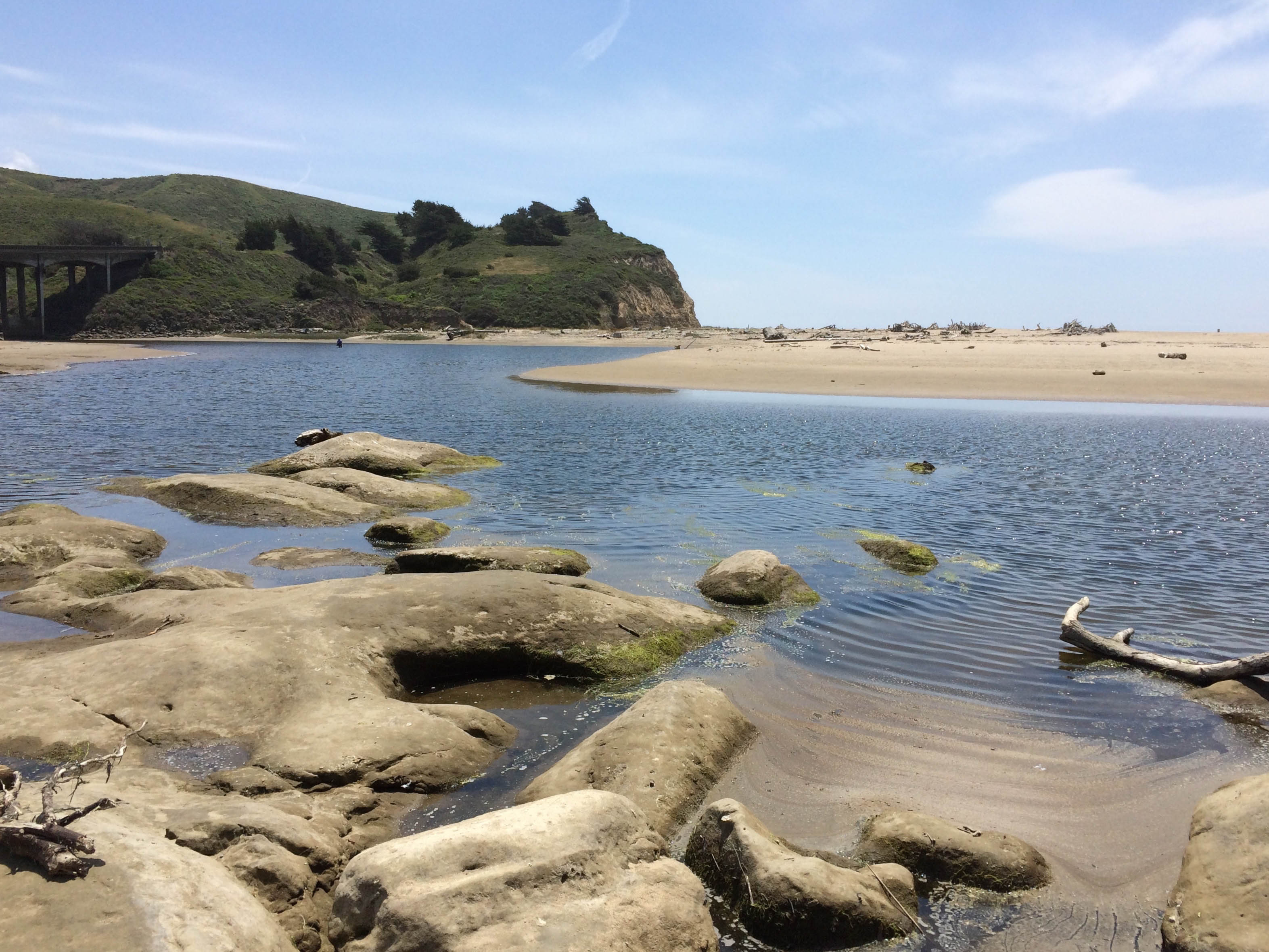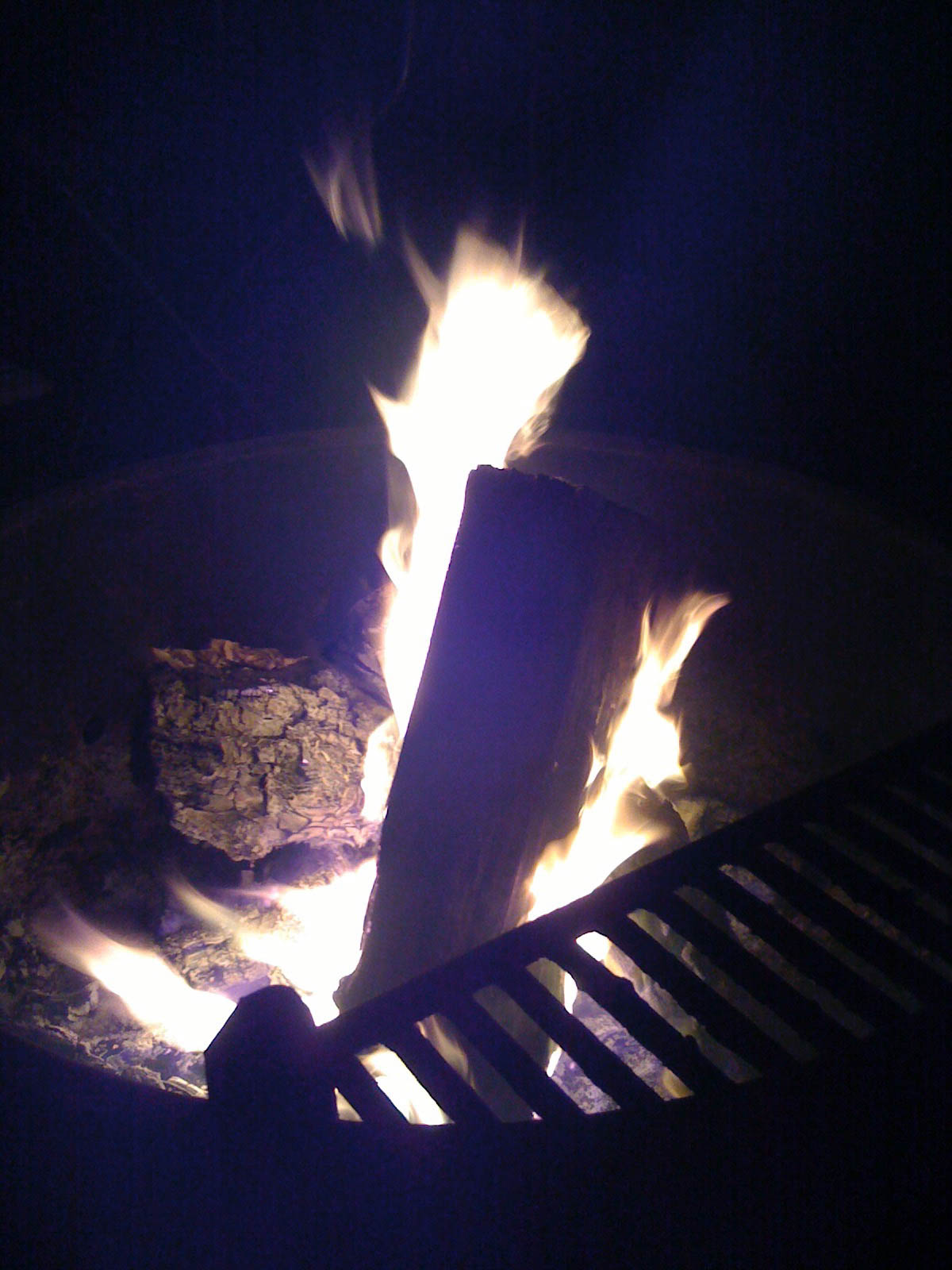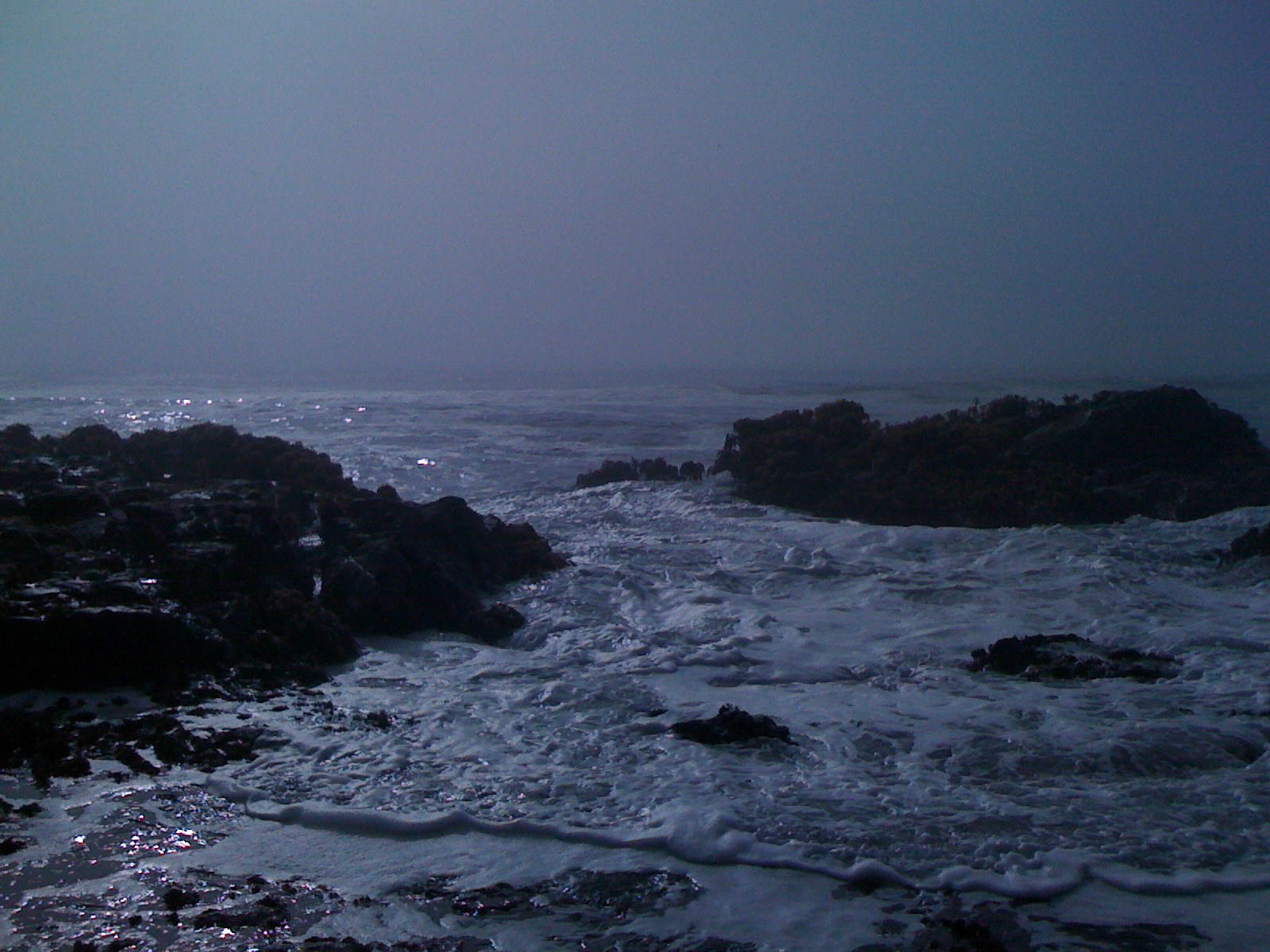Gazing into the campfire – a fire in no jeopardy whatsoever of being underfed – it occurred to me that my relationship to firewood while camping is the same as my relationship to money while playing poker. I am deeply afraid of running out.
The place I camp is Butano State Park. It is a redwood forest. Did I mention that it’s a redwood forest? And that it comes with daytime darkness and extra silence? And did I mention the conspicuous lack of ants, flies, bees, and mosquitos? And that the dominant animal species is the banana slug? And that when you walk in the forest, on the duff carpet, you are not really walking next to the trees, but through them, because really, the ground itself is just more and more redwood stuff, and the whole forest is like one really big tree?
The drive down California’s famous Coast Highway is stunning. Infinite ocean to the right, grassy mountains to the left. Up and over a ridge, and down into the next valley. Then another ridge and valley, and another. Each valley has its own river, forming a sandy delta where it meets the sea.
Most of the year, these deep river channels are under-utilized. They fill up only during the winter months, when the big rains come, and the big winds. Branches fall. Trees topple. And the swollen rivers transport the bio-debris down the mountain and deposit it at the beaches, where wind, sand, and critters clean the logs, and the sun dries them to bone white.
Soon after I discovered this place came a spark of joy when I asked the park ranger about burning driftwood at the campground. “Take all you want!” she said.
And I do. It’s a labor I love – walking hundreds of yards in the soft sand – rummaging through sprawling lodes of logs of every kind and size – carrying the chosen ones back to the car. I place my lovelies in the trunk and back seat, just so, to make room for more.
The campsite is five miles in from the ocean, and 1600 feet above it. Me and my saw work five minutes here, ten minutes there, and suddenly, hours later, I have a heaping array of wood for all occasions. And inside the large, metal, cylindrical fire pit lives the star of the show – crackling, or hissing, or quietly showing off.
Days pass and the woodpile shrinks, but it is never depleted. I always leave behind a stack of leftover logs for the next campers, with kindling on the side.
You could say I’ve gone too far with this. You could say I worry too much about running out of firewood. And you’d be wrong. I’m not the slightest bit worried. Which is kind of the point.
What does it mean, really, to have enough of something? Does it mean having barely enough? Does it mean having more than enough? Or does it mean having way more than enough? At the campsite, with things like fruit and veggies, I like to have barely enough, so that none is wasted. With things like olive oil and candles, I stock a tad more than enough, because I only have so much space in my bins.
But firewood? Enough is not enough, no matter how much enough actually is. Let’s say I arrive at the campsite at noon on day one with 50 logs, intending to go to the ocean at noon the next day to reload. Noon the next day comes around, and I burn the very last of the logs just before heading to the ocean. If we look back at the previous 24 hours to evaluate my wood-management skills, we see that I did not run out of logs, which is good, but does that mean I had brought “enough?”
NO! The problem with the 50-log pile is I’d know that if it was enough, it was barely enough, and I’d be in constant panic for 24 hours. 50 logs, as it turns out in this example, would be enough to keep the fire from going out, but not enough to keep me from going off.
So how many logs do I need? The answer is however many it takes so that whenever I look at the woodpile, the only thought that comes to mind is, “I have way more than I could possibly need.”
Sitting by the fire, I witnessed my wood obsession and asked why. Why am I like that? As is often the case with my self-probes, this one bumped into poker. I think my fear-of-running-out comes from sitting at the table for thousands of hours under a gathering storm of dread. The less money I had on me, the thicker the cloud. Let’s say I was playing $20-40 limit hold’em and I started with $1000 on the table and $1000 in my pocket. The forecast at that time is blue skies above, with scattered clouds on the distant horizon. If I run flat for a couple hours, the clouds drift closer. If I then lose some big pots, the clouds block the sun. Next comes some leaky play, and not long after I’ve got $0 in my pocket, and my last $600 on the table. Severe weather alert! Huge thunderhead directly overhead!
Then I win a nice pot and now I have $1000. The clouds break up and a hazy light casts a thin shadow of hope. Then I lose some, win some, whatever. I never play up to potential, because of that persistent cloud of fear.
Sometimes I walk away with money. Other times I get whittled to a nub, forced to wait for a pair or an ace to go broke with. And then two new pains drench me: shame, and having to quit.
I know the causes of those pains. With pride comes shame. With addiction comes withdrawal. Those pains have no dollar signs attached; they cannot be eliminated by adding money. But the dread of running short is all about dollars; it grows and shrinks based on nothing but cash.
So I had a little chat with the pain merchant.
“Hello, Mr. Merchant. I am about to play poker and I would like to buy some pain relief. How much will it cost me to not have to worry about running out of money today?”
“What will you be playing?”
“$20-40 limit hold’em.”
“How much do you usually take?”
“About $2000.”
“What’s the most you have ever lost at that limit?”
“Ever?”
“Yes, ever.”
“I won’t allow myself to hold on to that kind of data.”
“Take a guess.
“I’d say $2500. But it took a really long time.”
“Okay then. By your own history, if you sat down to play with $2500 in your pocket, you should enjoy total peace of mind as to not running out of money. Does that number feel right to you?”
“No.”
“What’s wrong with it?”
“It’s too small.”
“Why?”
“I think it’s because when it comes to quitting, I always want to quit because I want to, and I never want to quit because I have to.”
“Good one! Now we’re getting somewhere. Tell you what. Try taking $5,000 with you today and see if that doesn’t blow your clouds away.”
“So basically what you’re telling me is more bankroll equals less pain?”
“You said it, not me.”
“I do believe this will work. So, what do I owe you for the pain relief?”
“You decide my fee. But there’s one condition.”
“What’s that?”
“It has to hurt.”
As my clients discover, less pain and more money go together. Coaching by Tommy




Add Comment